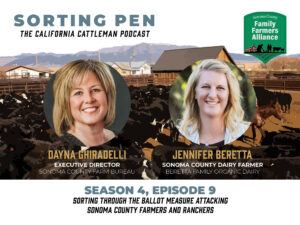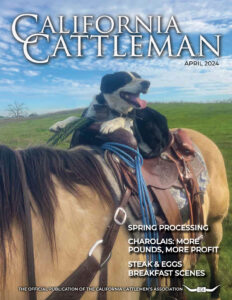
CALIFORNIA CATTLEMAN WEEKLY
April 29, 2024
To read the full version each week, please subscribe below.
USDA Finalizes Animal Disease Traceability Rule Requiring Electronic Identification
On Friday, USDA’s Animal and Plant Health Inspection Service (APHIS) released a final animal disease traceability rule requiring electronic identification for the interstate movement of all intact cattle over the age of 18 months, all dairy cattle and all exhibition or rodeo cattle. The rule will take effect six months after it is formally published in the Federal Register.
Existing regulations finalized in 2013 require visually readable ID tags for cattle moved interstate. While tags must still be visually readable under the new rule, the new regulation additionally requires tags to be electronically readable – enabling USDA to “more efficiently and effectively…complete a trace” to “compartmentalize animal disease outbreaks in order to mitigate adverse economic impacts,” according to the final rule.
According to the National Cattlemen’s Beef Association (NCBA), “While the rule is technology neutral, only [Radio Frequency Identification (RFID)] tags (840s) are currently approved by APHIS for official identification,” though “New technologies are expected to be approved by APHIS as they come to market and are proven to be compliant with other criteria of the rule.”
The final rule does provide that “visual eartags applied to animals prior to” the rule’s effective date “will be recognized as official eartags for the life of the animal.” NCBA notes, however, that if an animal’s tags need to be replaced after the rule takes effect, the replacement tag would have to be “an 840 tag or subsequently approved electronically and visually readable tag.”
The regulation does not apply to cattle herds traveling interstate without a change in ownership on a pasture-to-pasture movement permit.
As previously reported in California Cattleman Weekly, the Consolidated Appropriations Act of 2024 allocated $15 million to APHIS to “provide…electronic identification tags and related infrastructure needed for stakeholders to comply with the proposed rule.” APHIS will likely distribute tags in California through the California Department of Food and Agriculture. CCA will keep members apprised as additional information regarding the rule’s implementation develops.
SWRCB Releases New Fact Sheets and Renews Call for Annual Reporting Compliance
The State Water Resources Control Board (SWRCB) on Friday announced the availability of two new fact sheets – “Water Rights 101” and “Water Use Reporting Requirements” – to improve water rights holders’ understanding of water rights and reporting requirements.
The SWRCB used the release of the fact sheets as “a reminder to all water right holders to file water rights annual diversion data from water year 2023 (October 1, 2022 – September 30, 2023).” Reports for all diverters were due February 1, but the SWRCB notes that roughly 13,000 diverters have not yet reported their diversion and use of water for the 2023 water year. In its announcement, the SWRCB asked delinquent filers to “please file immediately.” As previously reported in California Cattleman Weekly, the SWRCB is in the process of issuing notices of violation to delinquent filers.
New Episode of Sorting Pen: The California Cattleman Podcast
A new episode of Sorting Pen: The California Cattleman Podcast is out now! In this week’s episode, Danya Ghiradelli, Sonoma County Farm Bureau’s Executive Director and Jennifer Beretta, fourth-generation Sonoma County dairy farmer, board member of Sonoma Farm Bureau and dairy representative for the California Cattle Council join Katie on the podcast to discuss “A ballot measure being proposed by an animal extremist group from Berkeley, CA aimed to eliminate Sonoma County’s diverse animal agriculture production.” Tune in to learn what the ballot measure is, potential impacts and how to support Sonoma County farmers and ranchers amid this attack. To listen, click here.
Registration is open for the 2024 Stockmanship and Stewardship Event in Fresno
Registration is now open for the 2024 Stockmanship and Stewardship Event, Oct. 18-19, in Fresno, Calif. The event serves as an educational opportunity for cattlemen and women to participate in demonstrations led by animal handling experts, become Beef Quality Assurance (BQA) certified, network with others and learn about various management practices. The program is sponsored by the National Cattlemen’s Beef Association (NCBA), Neogen, and the Beef Checkoff-funded National Beef Quality Assurance program. To learn more about the event and register, click here.
California Farm Bureau Launches Expanding our Roots: Beginning Farmers and Ranchers Mentorship Program
From the California Farm Bureau
The California Farm Bureau has launched the Expanding our Roots: Beginning Farmers and Ranchers Mentorship Program. The program will provide 400 beginning farmers and ranchers with 6-hours of no-cost mentoring services from farmers and ranchers with more than a decade of experience operating an agricultural production business in California; 200 mentees per the ’24 and ’25 seasons. The goal is to positively impact beginning farmer and rancher operations. To learn more about the program click here.
Administration Releases 81 Targets for Nature Based Climate Solutions
Governor Gavin Newsom has announced the release of California’s Nature Based Solutions Climate Targets 2024, which identifies “81 targets to use millions of acres to help absorb more carbon emissions.” The targets aim to “strategically harness the equivalent of more than half of [California’s] land to fight the climate crisis” and help the state meet its goal of “reaching carbon neutrality by 2045.” Much of the management in the strategy aligns with CCA goals, including the State’s priority of managing “33.5 million acres for reduced wildfire risk by 2045” through prescribed fire and “prescribed herbivory (grazing).” For additional details, see last week’s edition of California Cattleman Weekly.
CDFW Releases Report on Wolf-Livestock Compensation Pilot Program
The California Department of Fish and Wildlife earlier this month released a summary report detailing how the agency spent $3 million appropriated in the Budget Act of 2021 for the Department’s Wolf-Livestock Compensation Pilot Program. During the Pilot Program, the Department awarded 109 wolf compensation grants to 36 individual producers with livestock operations in four counties with known wolf activity, with roughly $135,000 going to direct loss compensation, $950,000 providing pay-for-presence compensation and the remainder funding non-lethal deterrence. CCA continues to lobby the Legislature and Administration to fund the Program in the 2024-25 Budget. For additional information, see last week’s edition of California Cattleman Weekly.
USDA Agricultural Marketing Service Seeks Nominations for the Cattlemen’s Beef Promotion and Research Board
The USDA Agricultural Marketing Service (AMS) is seeking nominations for the Cattlemen’s Beef Promotion and Research Board for the Southwest Unit. Beef producers within the United States who own cattle or any importers that import cattle or beef can be nominated by eligible organizations. To learn more about the Cattlemen’s Beef Board click here. To learn more about eligibility, click here. For more information, contact CCA’s Associate Director of Communications Maureen LaGrande.
Upcoming CCA Events
Tomorrow is the Final Day to Book a room for 2024 Feeder Meeting
May 22-23, 2024, San Diego, CA
The 2024 Feeder Meeting will take place at the San Diego Hilton Bayfront, May 22-23. The final day to reserve a hotel room is 4/30. For further information about the event and to book your room click here. To register, click here. Registration prices will increase onsite.
Registration for 2024 Midyear Meeting is Open!
June 26-27, 2024, Nugget Casino Resort, Sparks, Nev.
Registration for Midyear Meeting at the Nugget Casino Resort is now open! To register, click here. For more information on the CCA room block, click here. Look for more details on the meeting schedule to be posted in the coming weeks.
Upcoming Industry Events
Planning for Fire Resilience in the Coastal Zone: A case study of Marin County
May 20, 2024, 9:30 am – 2:45 pm, in person
The field workshop will allow participants to increase their knowledge of planning for fire resilience through a case study of Marin County. To learn more and register, click here.
Registration Open for 2024 NCBA Summer Business Meeting
July 8-10, Hilton San Diego Bayfront Hotel, San Diego, CA
Registration for the NCBA Summer Business Meeting happening July 8-10, 2024 at the Hilton San Diego Bayfront Hotel in San Diego. To register, click here. To view the agenda click here.
Industry News
Redding Air Attack Base Enhancements More Than Double Firefighting Capability U.S. Forest Service “On April 25, the USDA Forest Service and partners, including the Army Corps of Engineers and the City of Redding, will celebrate the completion of Phase 1 in a five-year, $28 million project to expand airtanker loading capabilities by 132% at the Redding Interagency Air Attack Base. The upgrades allow for simultaneous loading of five aircraft, up from two previously. This base is vital in providing initial and extended attack for wildfires across the Western United States.” To continue reading, click here.
US government will require more testing, tracking of bird flu in dairy cows CNN “The US Department of Agriculture said Wednesday that it is issuing a federal order to require more testing and reporting of H5N1 influenza, more commonly known as bird flu, in dairy cows.” To continue reading, click here.
A new episode of Sorting Pen: The California Cattleman Podcast is out now! In this week’s episode, Danya Ghiradelli, Sonoma County Farm Bureau’s Executive Director and Jennifer Beretta, fourth-generation Sonoma County dairy farmer, board member of Sonoma Farm Bureau and dairy representative for the California Cattle Council join Katie on the podcast to discuss “A ballot measure being proposed by an animal extremist group from Berkeley, CA aimed to eliminate Sonoma County’s diverse animal agriculture production.” Tune in to learn what the ballot measure is, potential impacts and how to support Sonoma County farmers and ranchers amid this attack.To listen, click here.



